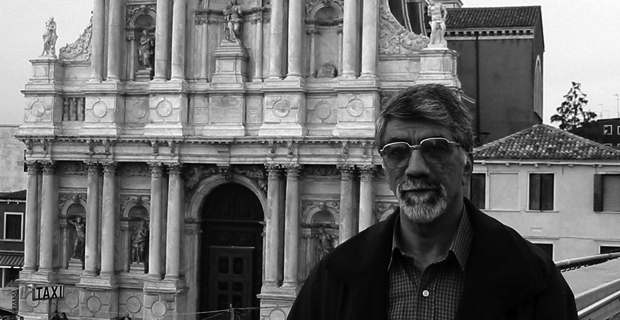
Born in 1953 in the South-Eastern city of Zahedan, Behzad Ghaderi should be regarded as the cavalier of Drama Studies in Iran. A peerless translator, an amicable professor, and author of a large number of research works and articles, he abides inclusion in any certain category of activities.
After elementary and secondary education in Kerman and Bojnurd, Ghaderi pursued English Language and Literature at Ferdowsi University of Mashhad, received his MA degree in American Literature from Shiraz University and finally had his PhD dissertation on British Drama 1960-1990. Besides diverse academic activities as researcher and professor of English, he introduced a large number of European dramas via his delicate translations – of Ibsen’s Peer Gynt, Edward Bond’s The Fool, Howard Brenton’s Bloody Poetry, O’Neil’s Hairy Ape, Churchill’s Top Girls, and George Steiner’s The Death of Tragedy as well as authorship of excellent books such as With The Lamp in Distorted Mirrors (Tehran: Qatreh Publications, 2005), and Revolutions and British Drama (New Delhi, Bahri Publications, 2002), to name a few.
Dr Ghaderi has been kind enough to respond – contemplatively and creatively – to The Parsagon Review‘s questionnaire.
PARSAGON: What are the top seven works of world literature that have had the deepest influence on your life and career?
DR GHADERI: Books that left a strong imprint on my mind:
- The audio-visual phase (the formation years 7-11)
The Shahnameh, Eskandarnameh, Hezar-o-yek Shab (Thousand and One Nights), Samak-e Ayyar (Samak the Con-Man), Amir Arsalan, Ketabha-ye Talayee (The Golden Books for Children).
It now sounds like an ancient, bygone time. Those days even defied what one may call ‘radio-days’. Ghahveh-Khanes (Tea-Houses) were still jewels of community life where males gathered, drank tea, boasted, raved mad, and never despaired. There was also a time in the evening when silence fell upon all those eager ears, when they opened those huge, golden books, giving them a chance to prove that they existed by reading episodes from them. ‘Reading’ is too inadequate a word for those occasions: it was recitation, improvisation, singing, Naghali and all that. It was a place where Imam Hussein (the Shepherd of the region who annually performed this role in Ta’ziyehs) sat next to Shemr (the killer of Imam Hussein who was the local butcher and annually performed this role in Ta’ziyehs); it was a place where the local grocer acted as Naghal re-enacting episodes from The Shahname, the school janitor of the district knew how to read aloud but melodiously from Amir Arsalan AND it was a place where they challenged one another in the manner of reading these tales (meaning to impress their audience more effectively).
My father didn’t take me with him but didn’t mind when I got there at the right time not to miss the public event. Now I see that place like Plato’s Symposium or Attar’s The Conference of the Birds but more of the former than the latter.
Then there were those wonderful Ketabha-ye Talayee (The Golden Books for Children) that my father would bring me when he went on one of his shopping enterprises, books so rich with imagery, people from remote lands, suffering and love and all.
2- The Later Phase (11 onwards)
A. Seven Persian Books:
1- The Shahnameh (Ferdowsi)
2- The Value of Emotions and Five Essays on Poetry and Drama [Arzesh-e Ehsasat Va Panj Maghale Dar She’r o Namayesh] (Nima Youshij)
3- The Blind Owl (Hedayat)
4- Iman Biyavarim be Aghaz-e Fasl-e Sard (Let’s Believe in the Beginning of the Cold Season; Forough Farrokhzad)
5- Rowzane ye Abi (The Blue Opening; Akbar Radi)
6- Marsiyeha-ye Khak (Elegies of the Earth; Shamlou)
7- The History of Constitution in Iran [Tarikh-e Mashrooteh-ye Iran] (Kasravi)
B. Seven Foreign Books:
1- The Symposium (Plato)
2- On the Nature of Universe (Lucretius)
3- Rosmersholm (Ibsen)
4- The Birth of Tragedy (Nietzsche)
5- The Idiot (Dostoyevsky)
6- The Confidence-Man (Melville)
7- Narcissus and Goldmund (Hesse)


Leave a Reply